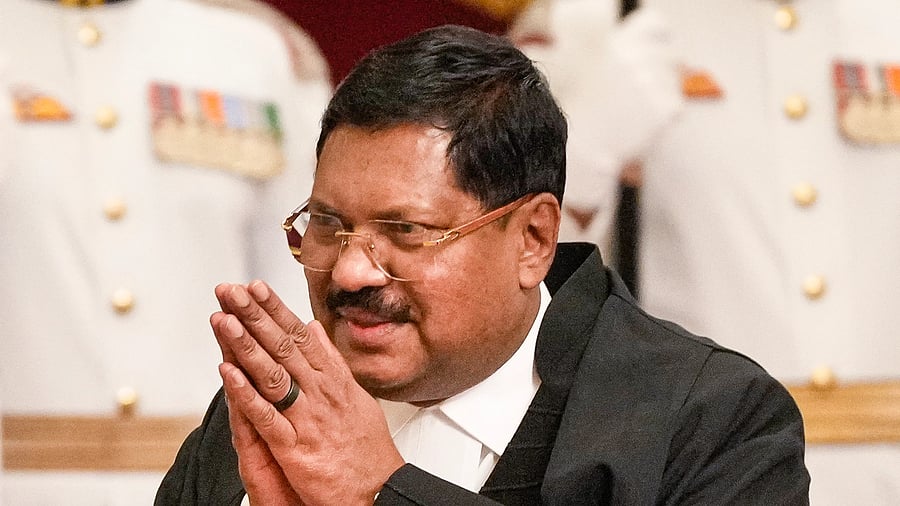
Credit: PTI photo
New Delhi: Chief Justice of India B R Gavai on Saturday favoured the enactment of specialised statutes and training of law enforcers and decision makers, in view of the vulnerability of a girl child in the digital era due to online harassment, cyberbullying and digital stalking as well as the misuse of personal data and deepfake imagery.
He was speaking at the national annual stakeholders consultation on 'Safeguarding the Girl Child: Towards a Safer and Enabling Environment for Her in India', organised under the aegis of the Juvenile Justice Committee (JJC) of the Supreme Court, in association with UNICEF, India.
He said despite constitutional and legal guarantees, many girls across the country continue to be tragically denied their fundamental rights and even basic necessities for survival.
This vulnerability exposes them to disproportionately high risks of sexual abuse, exploitation and harmful practices, such as female genital mutilation, malnutrition, sex-selective abortions, trafficking and child marriage against their will, he pointed out.
"To secure her safety is not merely to protect her body, but to free her spirit. To create a society where she can hold her head high in dignity and where her aspirations are nourished by education and equality...We must confront and overcome the deep-rooted patriarchal customs that continue to deny girls their rightful place," the CJI said.
Recalling Rabindranath Tagore's poem, 'Where the Mind is Without Fear', Justice Gavai said it captures the very essence of what is sought to be achieved in safeguarding girl child.
"That vision remains incomplete so long as any girl in our country lives in fear -- fear of violence, of discrimination, or of being denied the chance to learn and to dream," he said, adding that only when every girl child grows in an environment of freedom and respect can it be said with conviction that the country has awakened into that "heaven of freedom" of which Tagore so beautifully spoke.
Calling for a deeper examination of the social, economic and cultural barriers that continue to impede girls' lives, the CJI, in the presence of Union Minister for Women and Child Development Annpurna Devi and Cynthia McCaffrey, the country representative for UNICEF-India, said the threats faced by young girls are no longer confined to physical spaces, they extend into the vast and often unregulated digital world.
"Furthermore, in today's technological era, where innovation defines progress, it is important to recognise that technology, though empowering, also brings new vulnerabilities, especially for the girl child," he said.
From online harassment, cyberbullying and digital stalking to the misuse of personal data and deepfake imagery, the challenges have evolved in both scale and sophistication, he highlighted.
Emphasising the need for specialised training, the CJI said institutions, policy frameworks and enforcement authorities must, therefore, be attuned to the realities of the times.
"Training programmes for police officers, educators health professionals and local administrators should consequently incorporate a sensitive approach, equipping them to respond with empathy, nuance and contextual understanding," he said.
The CJI further pointed out that the laws addressing online sexual exploitation, digital trafficking and cyber harassment must be paired with effective enforcement, education and awareness initiatives.
"Protecting the girl child must become a core priority of digital governance, ensuring that technological progress is accompanied by ethical safeguards," he stressed and said in a digital future, technology must serve as a tool for liberation rather than exploitation.
"Safeguarding the girl child today means securing her future in classrooms, workplaces and on every screen she encounters," he said, addressing the programme that was attended by several Supreme Court and high court judges, child rights activists, lawyers and others on the premises of the apex court.
Justice B V Nagarathna, the chairperson of the JJC of the apex court, said a young girl in India can be said to be a truly equal citizen only when she can freely aspire to do anything that her male counterpart does and receive the same quality of support and resources to do so, facing no barriers specific to her because of her gender.
"Put differently, the odds of her being born at all, having access to the right nutrition, care, education and material resources, a secure and safe environment, developing a distinct sense of self and being able to achieve whatever she sets her mind to has to be equivalent to that of a boy child born in this country. She should not merely survive but actively thrive," she said.
Justice J B Pardiwala, a member of the JJC, said protecting the girl child means ensuring that every girl has the right to live, learn and grow with equality, free from harm, discrimination and violence, such as female foeticide and child marriage.
"It involves providing equal access to education, healthcare and resources, promoting her value in families and society, and empowering her to make informed choices and reach her full potential as a respected individual and contributing member of the community," he said.
Justice Pardiwala introduced a handbook on 'Child Rights and the Law', prepared by the Centre for Research and Planning of the apex court under the guidance of the JJC.
